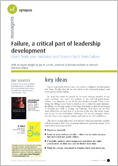If Only

Avoiding the negative effects of regret and making this emotion work to your advantage.
Author(s): Neal Roese
Publisher: Broadway Books
Date of publication: 2005
Manageris opinion
This book, written by a psychologist, sheds light on the personal as well as professional dimensions of regret. It invites readers to gain perspective on this emotion, generally considered as negative, in order to learn to use it in a positive way.
First of all, explains the author, regret isn’t unhealthy. It emerges naturally in the human brain as a result of “counterfactual thinking.” When a situation has several possible outcomes, we tend to keep in mind those that are not realized. For example, if we toss a coin and it comes up “heads,” we know that it could have come up “tails.” In the same way, if we are responsible for a failure, we know that we could have done things differently, which naturally causes us to feel regretful.
Counterfactual thinking can be a bad thing if we let ourselves be submerged by it. The author alerts readers to the risks of self castigation or conversely of finger pointing.
The most valuable lesson to be derived from this book is that regret can be positive. Indeed, it can help us gain perspective, learn from our mistakes and even muster the energy needed to rise to the challenge in the face of adversity. The author offers many tips on how to capitalize on regret and channel it effectively. Those with little time are advised to go first to chapters 2 (on the utility of regret), 4 (on the traps to avoid) and 8 (which proposes ways to use regret in a positive way).
